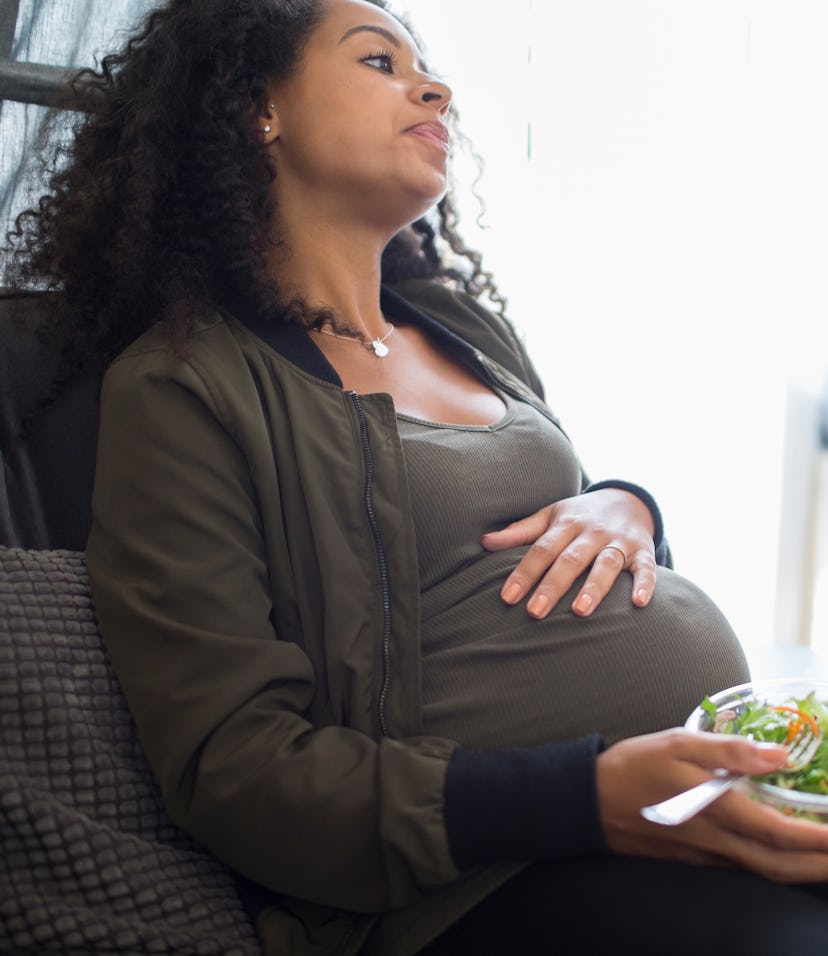Pregnancy

How To Relieve Heartburn During Pregnancy
When you feel the burn, remember that this, too, shall pass.
The only time in my life I’ve ever enjoyed dipping sour pickles in crunchy peanut butter was in the throes of pregnancy cravings with my youngest son. But later I would feel a rush of stinging bile surge up my throat at unpredictable intervals. Yes, I was that lucky mom-to-be to experience the cruel combination of weird cravings and heartburn. The burning sensation sent me scrambling for much-needed relief from pregnancy heartburn. Thankfully, there are some ways to tame the flame and even a few things to try to prevent it.
Pregnancy Heartburn, Explained
First of all, heartburn has nothing to do with the heart but is called that because it affects your digestive system above your stomach, an area close to your heart. As with many other pregnancy side effects, heartburn during pregnancy is usually caused by the myriad changes your body experiences during this time. The hormones your body produces while pregnant combined with pressure on your internal organs as your uterus expands are the main culprits.
“Pregnancy causes the body to produce more progesterone and relaxin. Because of this, food stays in the stomach longer and can back up more easily into the esophagus,” Dr. Jessica Shepherd MD, an obstetrician and chief medical officer of Verywell Health, tells Romper. “Pressure on your stomach from your growing baby can also push the contents of the stomach up into the esophagus which can cause heartburn.”
Birth educator and doula Sara Lyon tells Romper that the burning sensation has to do with the high pH of stomach acid. “This acid is specially calibrated to digest food before it moves into the intestines and the stomach is lined with tissue and mucus that protects the tissue from damage. The esophagus, however, is not, and stomach acid in the esophagus will cause a burning sensation and potentially damage to the esophageal tissue,” Lyon explains. “The pregnancy hormone relaxin can soften the smooth muscle fibers of the gastrointestinal valves, preventing a tight seal between the stomach and the esophagus.”
Most medical authorities report pregnancy heartburn is common, and could be experienced by about half of pregnant women. Shepherd tells Romper that it is most prevalent in the latter part of gestation. “Heartburn can happen at any time throughout pregnancy but is more likely during the second and third trimester as your baby continues to grow and the area of the uterus to the diaphragm and esophagus is shortened,” she explains.
Ways To Prevent Pregnancy Heartburn
You can’t really know if you’ll have heartburn during pregnancy until it happens, but there are ways to make it less likely to occur, starting with your diet. Avoiding known food triggers like intense spices, citruses, and acidic, tomato-based dishes can be helpful. “You should also try to eat meals slowly and avoid lying down immediately after eating,” Shepherd tells Romper. “Be sure to get enough rest and keep up your water intake.”
There are also foods you can consume to try to stave off heartburn, Lyon tells Romper. “Traditional wisdom tells us that almonds are really helpful, so if you’re really invested in managing the heartburn without medication, you can prepare sprouted almonds to snack on and make fresh almond milk.” Eating smaller meals with low pH foods more frequently throughout the day can also help prevent pregnancy heartburn.
How To Relieve Pregnancy Heartburn
When you experience heartburn during pregnancy, immediate relief is not easy to find. Changing positions can sometimes keep the burning sensation at bay, but the discomfort may still continue to occur. “If your valves are going to relax with oxytocin, that’s just your fate. You can try sleeping at an angle, but much like stretch marks, if it’s going to happen, it’s going to happen,” Lyon explains.
Some over-the-counter (OTC) heartburn-relief medications like Tums and Rolaids are typically considered safe to take during pregnancy, but it’s always best to discuss the use of these medications with your doctor. “If you’ve tried the natural methods such as avoiding certain foods, drinks, and are well-rested, etc., and you still have discomfort, you should speak with your doctor to see what can be done to soothe the feeling,” Shepherd tells Romper.
While pregnancy heartburn is not something to be overly concerned about (it usually subsides once your baby is born), Lyon says that anyone who is awakened frequently overnight with heartburn or doesn’t respond to OTC medications should continue this conversation with their doctor to prevent worsening. “Ignoring the symptoms can lead to long-term damage to the sensitive tissue of the esophagus, and prescribed medications can help with severe symptoms that might be diagnosed as GERD, or gastroesophageal reflux disease.”
Experts:
Dr. Jessica Shepherd, MD, OB/GYN, chief medical officer of Verywell Health
Sara Lyon, doula, owner/director Glow Birth & Body, author The Birth Deck and You’ve Got This